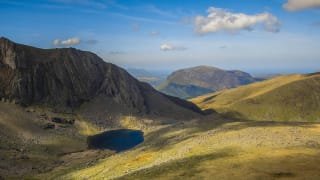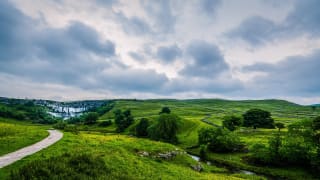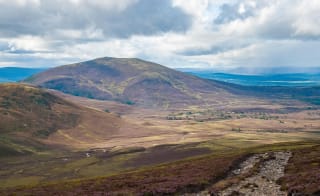Choose park
Check in
Check out
Guests
Check in/out
Guests
Search
There's something charming about waking up to birdsong instead of traffic, and trading your usual stroll around the block for a walk that leads somewhere worth going.
The UK's packed with incredible hiking and camping combinations that'll surprise you, from gentle coastal walks to mountain adventures that actually deliver.

UK hiking routes for all levels – from gentle coastal walks in Cornwall to mountain challenges in North Wales and the Scottish Cairngorms.
Perfect camping pairings – enjoy scenic pitches near trails, from St Ives Bay in Cornwall to Sandy Balls in the New Forest.
Weekend hiking getaways – discover top routes like Snowdon via the Watkin Path, Malham Cove & Gordale Scar, and Beachy Head.
Beginner-friendly options – try the Meon Valley Trail, Spa Trail in Lincolnshire, or Hayle to St Ives coastal walk for an easy start.
Dog-friendly adventures – many campsites and trails welcome four-legged hikers, making it easy to bring pets along.
Plan for UK weather – pack layers, book campsites early, and download offline maps to make the most of your outdoor escape.
Sometimes you need to swap the sofa for something a bit more scenic, and let's be honest, the UK's got some absolute belters when it comes to weekend hiking adventures. We're talking proper "wow, did I just take that photo?" territory.
North Wales doesn't mess about when it comes to dramatic landscapes. The mountains here have attitude, and we're here for it.

Snowdon via the Watkin Path (8 miles) offers the most scenic route up Wales' highest peak, winding past waterfalls and old copper mines. It's challenging but doable for weekend warriors who fancy earning their post-hike pint.
Cadair Idris Circular (6.2 miles) gives legendary views alongside your leg workout: local folklore claims anyone who sleeps on the summit will wake up either a poet or completely mad (we'd recommend sticking to day walks).
Rhinog Fawr (5.5 miles to 7 miles) is a little wilder, delivering proper wilderness vibes with ancient stone circles thrown in for good measure. It’s much quieter and more remote than Snowdon, complete with some scrambling too (no, not eggs).
The Yorkshire Dales are like the British countryside dressed up for a postcard. Rolling hills, limestone cliffs, and enough stone walls to keep a dry-stone waller busy until 2050.

Malham Cove & Gordale Scar Circular (4.5 miles) combines two of the Dales' most Instagram-worthy spots in one satisfying loop. The limestone amphitheatre at Malham Cove is genuinely jaw-dropping, while Gordale Scar's dramatic gorge feels like something straight from the mind of Tolkien.
Ingleborough from Clapham (10 miles circular) takes you up one of Yorkshire's Three Peaks via one of the largest underground chambers in Britain, while the summit offers jawdropping panoramic views across the Dales.
Three Peaks Challenge traditionally covers all three peaks in 12 hours, but we reckon Two Peaks over a weekend is plenty enough. You’ll still get the stunning views, aching calves, and heroic pub stories: just with a bit more sleep and a lot less stress.
The South Downs prove that you don't need towering peaks for proper walking satisfaction. These rolling chalk hills offer genteel hiking with pub stops that actually deserve the detour.

Winchester to Exton (12 miles) kicks off the famous long-distance trail with quintessential English countryside: think Jane Austen with better hiking boots.
Amberley to Devil’s Dyke (18 miles) delivers ancient woodlands, rolling chalk hills, and sweeping views across the Weald, complete with plenty of good picnic and photo spots along the way.
Eastbourne to Alfriston via Beachy Head (11.5 miles) combines dramatic white sea cliffs (including the UK’s highest) with one of England's most photographed lighthouses.
Yes, the name still gets a giggle, but the location's no joke. Nestled in the New Forest, Sandy Balls perfectly positions you for South Downs adventures while having ancient woodland and wild ponies as neighbours. The hot tubs don't hurt either.
Start early to beat crowds and bag the best camping spots. Pack layers because British weather treats forecasts as loose suggestions (seriously, it's like asking a teenager to clean their room). Download offline maps: signal is patchy when you're properly off the beaten track. And crucially, don't hike yourself into exhaustion on day one.
No matter if you’re into mountain trials or rambles between well-equipped campsites, the UK has a walk (and a pitch) for everyone. Some routes serve up sky-wilderness, while others deliver plenty of pub pit spots. However, all guarantee fresh air, scenery worth the effort, and that unbeatable ‘first cup of tea outside’ feeling..

Cornwall’s coastline is Britain in all its glory: jagged cliffs, turquoise coves, and enough cream tea stops to undo all your hiking. Inland, ancient stone crosses and sleepy villages give the place a timeless feel.
Find out moreThe South West Coast Path spans a whopping 630 miles, but you can pick almost any section for a day’s hike. Get dramatic cliff-top views, hidden beaches, and possibly a seal or two for company.
Lizard Coastal Walk (7 miles) loops around Britain’s most southerly point. Expect wild flowers, sparkling sea, and the sort of rugged drama that makes you want to take up watercolours.
Saints Way Trail (30 miles) is a coast-to-coast journey from Padstow to Fowey, complete with rolling hills, ancient churches, and quiet hamlets. Ideal for multi-day camping treks.

Flat? Sure. Boring? Absolutely not. Lincolnshire hides sweeping wetlands, medieval market towns, and big-sky views that make pitching a tent feel cinematic. You’ll find plenty of peaceful trails where your only company might be herons and the occasional tractor.
Find out moreViking Way (147 miles) goes from Humber to Rutland, mixing gentle farmland, picture-perfect villages, and enough open space to make you feel gloriously small.
Lindsey Trail (69 miles) is a multi-use route through the Lincolnshire Wolds. Expect meandering hills (yes, they do occasionally exist here), idyllic villages, and bridleways that make for both excellent hiking and horse-spotting.

Scotland's Cairngorms are a hikers playground: mountains, forests, and lochs as far as you can see. With the ‘right to roam’ on your side, you can explore high plateaus, hidden glens, and vast pinewoods without feeling hemmed in. You can also base yourself at a cosy campsite before heading deeper into the hills.
Find out moreThe Lairg Ghru Traverse (20 miles) offers one of Scotland's most epic mountain passes, cutting through the heart of the range between towering granite peaks. It's challenging but absolutely spectacular, with plenty of sheltered spots for pitching up.
Cairn Toul & Braeriach Loop (22 miles) takes you across Britain's third and fourth highest peaks: perfect for wild camping with views that'll make you forget your sleeping bag smells like a dirty sock.
Glen Feshie to Glen Einich (12 miles) weaves through ancient Caledonian pinewoods where you can camp among trees that were old when Braveheart was actually happening.
It’s best to ease yourself into this whole hiking and camping malarkey without ending up as a cautionary tale told around campfires. These routes are perfect for testing the waters (or should we say testing the hiking boots) without biting off more than you can chew.
Distance: 11 miles
Why it’s great for beginners: A gentle ramble through Hampshire’s prettiest countryside, following a disused railway line that’s as straight and smooth as your average Sunday stroll. You’ll pass sleepy villages, rolling fields, and the odd pub that looks like it’s been waiting centuries just to serve you lunch.

Set in 120 acres of New Forest woodland, Sandy Balls offers roomy grass pitches with nearby taps. On-site you’ll find pools, restaurants, bike hire, alpaca walks, and plenty of family activities. It’s forest camping with a polished twist: nature on your doorstep, creature comforts within strolling distance.
Find out moreDistance: 5 miles (circular)
Why it’s great for beginners: Countryside walk meets open-air history tour. This easy-going loop combines peaceful woodland, quiet lanes, and a scattering of old railway relics that make you feel like you’ve stumbled onto a film set. The terrain is friendly, trails well-marked, and the pace entirely up to you, whether that’s ‘energetic hike’ or ‘slow meander with cake breaks.’

Nestled in peaceful Lincolnshire countryside, Appletree offers electric pitches, dog-friendly stays, and clean facilities. Enjoy a refurbished bar, playground, splash pad, and even a golf course. It’s a laid-back base with enough amenities to keep everyone happy, whether you’re here for hiking, family fun, or a quick weekend escape.
Find out moreDistance: 6 miles
Why it’s great for beginners: Cornwall's coastal walking paths can be brutal in places, but this stretch is beginner-friendly gold. You get proper coastal drama, including rugged cliffs, hidden coves, and those Instagram-worthy views, without the leg-destroying climbs. The path's well-maintained, St Ives makes a brilliant reward at the end, and if you get tired, there's always the train back.

After your coastal triumph, you'll want somewhere that celebrates your achievement with more than just a pat on the back. Camping at St Ives Bay offers heated pools for tired muscles, proper facilities for first-time campers, and you're close enough to St Ives for celebratory fish and chips.
Find out moreStart small and work up: nobody expects you to conquer Everest on day one. Break in your boots before the big day (blisters are nobody's friend). Pack snacks like your life depends on it, because hangry hiking is dangerous hiking. And, as always, tell someone your plans and stick to them.
Planning a hiking and camping trip shouldn't feel like organising a military operation. However, a bit of forward thinking can be the difference between "best weekend ever" and "why didn't we just stay home and watch Netflix?"
British weather has commitment issues: it'll promise sunshine and deliver sideways rain faster than you can say "waterproof jacket." Check multiple forecasts, pack for all seasons, and remember that mountain weather does its own thing regardless of what your phone says.
Gone are the days when you could rock up to any campsite and find a pitch. Popular spots fill up faster than a pub quiz on a Tuesday night, so book early to avoid sleeping in your car or, worse, driving home defeated.
Your rucksack isn't a TARDIS: every gram counts when you're hauling it up hills. Multi-use items are your friends: a spork, clothes that work as layers, and snacks that won't turn to mush. If you're debating whether to bring something, you probably don't need it (yes, that includes the portable coffee maker).
Know where you're going and have a Plan B for when your legs stage a revolt. Download offline maps, check tide times for coastal walks, and always tell someone your plans. Getting lost builds character, but getting really lost builds search and rescue call-outs.
Don't leap straight into conquering the Highlands if you've never camped further than your back garden. Build confidence with nearby adventures first: you'll learn what works without being miles from civilisation when your tent decides to resemble modern art rather than shelter.
Good boots, decent waterproofs, a reliable tent, and enough food to keep everyone happy. Everything else is just nice-to-have extras that'll weigh you down and clutter your campsite.

Let's be honest: after a day scrambling up hills and pretending you're not absolutely knackered, the last thing you want is to arrive at a campsite that's basically a muddy field with questionable toilet facilities.
At Away Resorts, our camping breaks put you bang in the middle of some of Britain's best hiking territory. Think Cornish coastal paths, Yorkshire Dales drama, and Scottish Highland adventures, but with the bonus of proper facilities that actually work. Clean shower blocks with hot water that doesn't run out, electric hook-ups for charging your phone, and heated pools for those post-hike aching muscles.
No more wrestling with tent poles on uneven pitches or discovering the ‘facilities’ are a portaloo that's seen better decades. You get all the outdoor adventure and camping authenticity, but with the comfort of knowing you can have a shower and maybe even grab a pint without hiking back to civilisation.
Sadly no: wild camping's generally illegal in England and Wales (except parts of Dartmoor). You'll need designated campsites or landowner permission. Scotland's different though, with proper ‘right to roam’ laws. For an easy option, book a pitch with Away Resorts, where you can with family, friendly, and even your dog.
That's like asking for the best biscuit: it depends what you're after! Away Resorts has cracking camping spots across the UK, from coastal Cornwall to Scottish borders, all with proper facilities and hot tubs.
Generally not legally, but some beaches allow it with permission. Check local bylaws first: nothing ruins a seaside adventure quite like getting moved on by rangers at 2am. If you want the sea on your doorstep without the risk, many of Away Resorts’ stunning holiday parks are right by the coast, including Whitecliff Bay, Mersea Island, and St Ives Bay.
Only with landowner permission in England and Wales. Scotland's more relaxed under access laws, but stick to non-commercial forests and follow Leave No Trace principles. Avoid private woodland without asking.
Late spring through early autumn (May-September) offers the best weather and longest days. You may want to avoid peak summer crowds by choosing shoulder seasons: fewer people, lower prices, same stunning scenery.
Dog-friendly camping is available in most UK campsites (including Away Resorts!) Most trails also welcome well-behaved dogs on leads, especially during lambing season (March-July). Check local restrictions, bring poo bags, and consider your dog's fitness level: they need hiking training too!
Whilst you wait... just think about being in your swimmers, the sun's out and the smiles are big
Enter your details to make a payment or request a change
Don't remember your details? Check your confirmation email, or speak to our team
Are you an owner with us? Click here to login